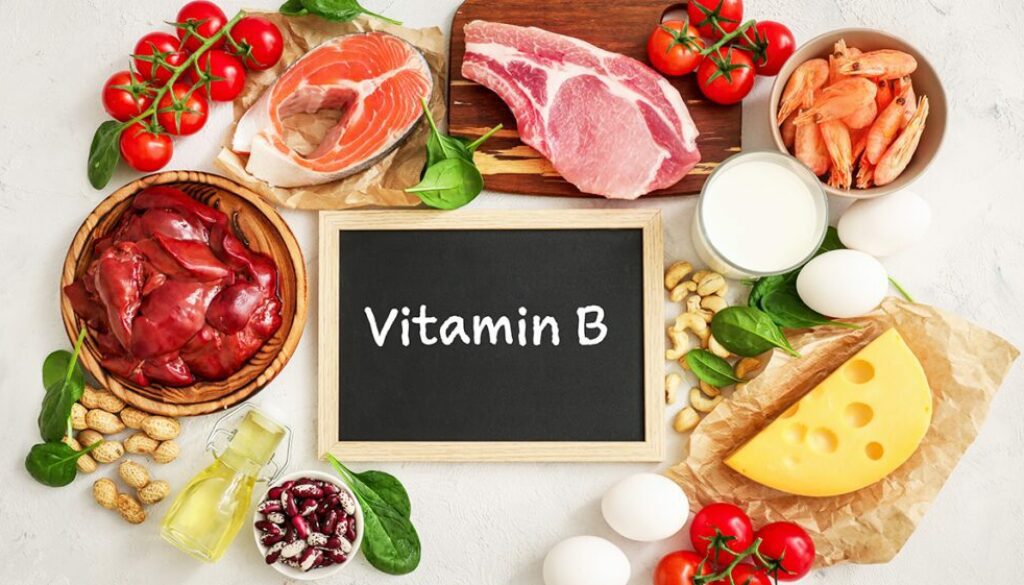Breaking Down Vitamin B
B vitamins are sometimes thought of as ‘energy vitamins’. The B-group, or vitamin B complex, consists of eight different B vitamins. Together these nutrients aid the body in a range of functions, from metabolism to the creation of blood cells. Each vitamin has its own unique function, which we will break down below.
Thiamin (B-1)
Thiamin, or vitamin B-1, is present in several basic cell functions as well as the breakdown of glucose for energy. Thiamin is naturally present in some animal proteins and whole grains. It is also added to some breads, cereals and baby formulas.
Thiamin can be taken away from foods from high-heat cooking or lengthy cooking times. It can also be lost if any water it is cooked or soaked in is thrown out. Food processing can also remove thiamin from foods, which occurs in refined white breads and rice.
Riboflavin (B-2)
Vitamin B-2, or riboflavin plays a large role in energy production. It also assists the body in the breakdown of fats, medicine and steroid hormones. Riboflavin can generally be found in some dairy products like eggs and milk.
Niacin (B-3)
Vitamin B-3, or niacin, is responsible for converting energy from nutrients into a form the body can use. It helps keep your skin healthy and supports the nervous and digestive systems.
Niacin is found in just about every protein-rich food. Unlike other B-group vitamins, niacin is heat stable and is not generally lost in cooking.
Pantothenic Acid (B-5)
Vitamin B-5, or pantothenic acid, is essential for the body to create new coenzymes, proteins and fats. It is carried throughout the body in red blood cells to use for energy and metabolic processes.
Since vitamin B-5 is found in all living cells, pantothenic acid is available in almost all plant and animal-based foods. The best sources are some meats, vegetables and fortified cereals. It is also largely available in:
Vitamin B-6
Vitamin B-6 aids in brain development, immune function and amino acid metabolism. Vitamin B-6 is very bioavailable. It can be found in a variety of plant and animal-based foods, including dark leafy greens and bananas.
Biotin (B-7)
Biotin, or vitamin B-7, plays a vital role in assisting enzymes to break down nutrients, regulate signals sent through cells and genetic activity. Many foods with a higher healthy fat content contain biotin.
Folate, or folic acid (B-9)
Folate is the name for the natural form of vitamin B-9. Folic acid is a synthetic form of the vitamin and is present in fortified foods and some supplements.
Folate helps to form RNA and DNA and helps break down amino acids. Folate is needed to produce healthy red blood cells and is critical during pregnancy for fetal development. If you are newly pregnant or planning to become pregnant, speak with your women’s health doctor about your folate intake.
Plenty of foods naturally contain folate. However, folic acid has been added to foods and supplements in the past few decades since it is better absorbed. If a food has added folic acid, it will be labeled ‘enriched’.
Certain groups require increased folate intake; people who are pregnant, have celiac disease, abuse alcohol or have conditions that interfere with nutrient absorption. A folate deficiency could present the following symptoms:
- Oral sores
- Weakness
- Heart palpitations
- Irritability
- Shortness of breath
- Skin, hair or nail changes
Vitamin B-12
Vitamin B-12 is necessary for forming red blood cells and DNA. It’s essential for the function and development of brain and nerve cells. Vitamin B-12 is found in animal-based products naturally.
A vitamin B-12 deficiency is often a risk for vegetarians and vegans who are not taking nutrient supplements. It can also be a risk for people with Crohn’s disease, celiac disease or have had stomach surgery. Symptoms of a B-12 deficiency can include:
- Weight loss
- Megaloblastic anemia
- Infertility
- Dementia
- Nerve damage
- Fatigue
Sources of Vitamin B:
Some foods are plentiful in several B vitamins. Some of those foods include:
- Salmon
- Leafy greens
- Liver
- Eggs
- Milk
Here are more foods high in vitamin B. You can also get vitamin B in your diet by taking supplements. Speak with your doctor about which supplements work best for you.
Conway Medical Center is Here to Help
We recommend speaking with your primary care provider before taking any supplements, especially if you are currently taking other medications. New to Horry County and looking for a primary care provider? No matter where you live, there is a CMC Primary Care doctor near you.
We have offices at the following locations:




